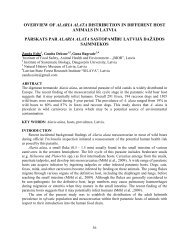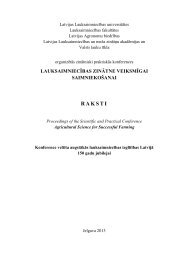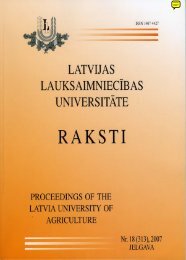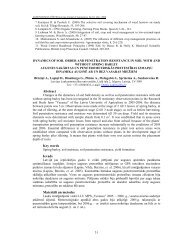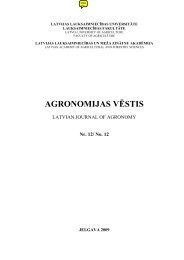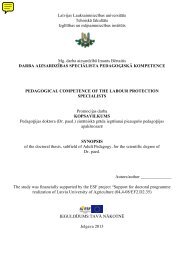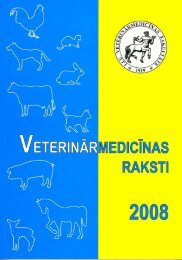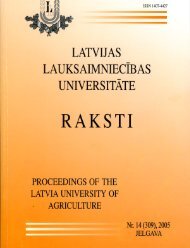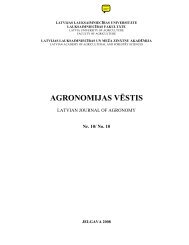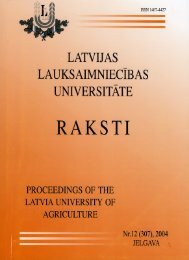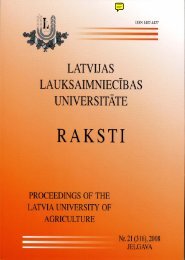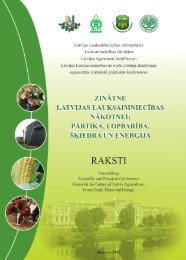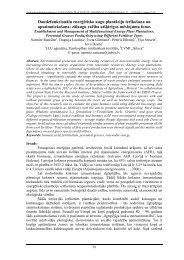Latvia University of Agriculture - Latvijas Lauksaimniecības ...
Latvia University of Agriculture - Latvijas Lauksaimniecības ...
Latvia University of Agriculture - Latvijas Lauksaimniecības ...
You also want an ePaper? Increase the reach of your titles
YUMPU automatically turns print PDFs into web optimized ePapers that Google loves.
A. Jemeļjanovs The Experience <strong>of</strong> RI “Sigra” towards Improved Research Capacityand Better Integration into European Research Areafunders need to ensure that they are willing to fund both basic and strategic researchrelevant to farm animal breeding and reproduction if we are to realize the promise<strong>of</strong>fered by current developments in the biological sciences. Mechanisms that supportshared-cost projects between industry and public funds in the middle <strong>of</strong> the pipeline areparticularly valuable mechanisms that should be developed further.Technology transfer needs to be (come) an integral part <strong>of</strong> research. It is crucial forinnovations to be implemented continuously. However, it is complicated for scientificresults and, what is more important, the opportunities for the practice <strong>of</strong> scientific resultsto get their way to the breeding and artificial insemination (AI) organizations. The oldsituation <strong>of</strong> implementation from R&D in an institute/university to the research, scienceand development (R, S&D) in a company is a top-down approach that is not workinganymore – a more interactive approach is needed. R&D <strong>of</strong> the industry will (need to) bemore involved in/with the research in the institutions.Examples <strong>of</strong> technology transfer are:– government-industry-research programmes;– club <strong>of</strong> interest around (complicated, precompetitive) research/education project;– technology transfer facilitators partnering several (small-scale) industries andresearch organizations.Public funding support <strong>of</strong> the pipeline should include appropriate structures andmechanisms that promote both business development from the research base, andproduct and process innovation in industry. Knowledge transfer networks or similarmechanisms that deliver two-way facilitation at the interface <strong>of</strong> scientific capabilityand industrial need within specific technology sectors are valuable mechanisms. Inthe animal breeding and reproduction sector, the combination <strong>of</strong> excellent scientificopportunities and structural challenges within industry means that public support <strong>of</strong>relevant knowledge transfer mechanisms is appropriate if the potential benefits are tobe realized. “Sigra” has close contacts with more than 30 partner organizations (privatefarmers, pr<strong>of</strong>essional associations) in <strong>Latvia</strong> to ensure technology transfer in the fieldswhere the Institute is carrying out its activities.Relevance to the Objectives <strong>of</strong> the Food Quality and Safety PriorityFor <strong>Latvia</strong> as well as for European consumers, safety is a most important issueconcerning food. Recent episodes have undermined public confidence in the capacity <strong>of</strong>the food industry and <strong>of</strong> the public authorities to ensure that food is safe. The EuropeanUnion’s food policy must be built around high food safety standards in order to protectand promote health throughout Europe. The objective <strong>of</strong> “Sigra” is to improve thehealth and well-being <strong>of</strong> <strong>Latvia</strong> citizens through a higher quality <strong>of</strong> their food, somehowre-addressing the classical “farm-to-fork” approach by giving priority to consumers,demands and rights for high-quality and safe food. This approach has a relevant impacton food production, i.e. we move from the needs <strong>of</strong> the consumer along the productionchain rather than simply assessing the safety <strong>of</strong> the food being produced. However, foodsafety with respect to chemical contaminants cannot be assessed without appropriateexposure assessments and surveillance programmes from farm to table and increasedcapability <strong>of</strong> the scientific advice system, so as to guarantee a high level <strong>of</strong> humanhealth and consumer protection. This implies that comparable standards <strong>of</strong> food safetyshould be elaborated and implemented throughout <strong>Latvia</strong>. Science has a paramountrole concerning food safety, through the identification <strong>of</strong> sources and pathways <strong>of</strong>contamination, the assessment <strong>of</strong> the actual importance <strong>of</strong> specific pollutants andtheir impact on health, the elaboration <strong>of</strong> strategies for risk control and managementwhich will assist in ensuring protection, particularly with the identification <strong>of</strong> the moreexposed and/or vulnerable population subgroups. Therefore, the completion and smoothoperation <strong>of</strong> the internal market for foodstuffs make it necessary to examine and evaluatescientific questions relating to food in such disciplines as medicine, nutrition, toxicology,food hygiene, biotechnology, and chemistry, particularly when these questions concernhuman health.The primary goal <strong>of</strong> “Sigra” activities is to promote and facilitate the interaction<strong>of</strong> interested local parties with mainstream research activities, with EFSA and otherinternational and supranational bodies or activities. The impact <strong>of</strong> this “Sigra” workwill be at both national and European level. Problems will be characterized in terms<strong>of</strong> existing resources, infrastructures, organizational features, data sources, points <strong>of</strong>strength and weakness, with a view <strong>of</strong> contributing to improved understanding <strong>of</strong> gaps104 <strong>Latvia</strong> <strong>University</strong> <strong>of</strong> <strong>Agriculture</strong> – 70, 2009



